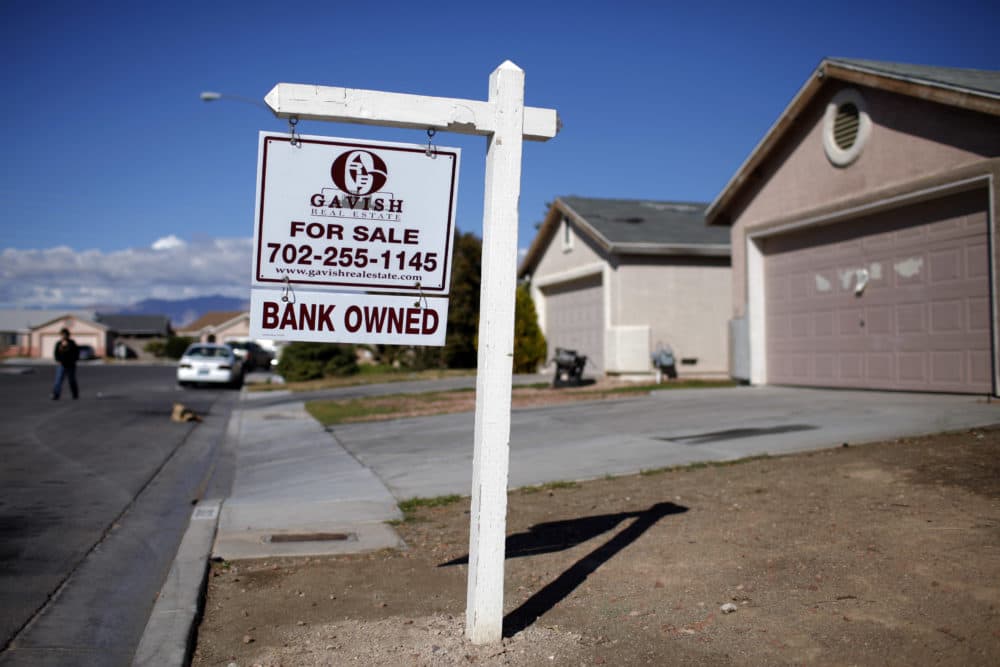Advertisement
'I Have This Fear It's All Gonna Happen Again': Former Las Vegas Homeowner Remembers Housing Crisis
Resume
Leo Murrieta lives in Las Vegas and works as director of Make The Road Nevada, a civil rights organization that protects the rights of immigrants and working families in Nevada. Before the recession, he and his family — his mom and dad, brother, sister, and nieces — lived in North Las Vegas in one of the zip codes that would become the hardest hit in the foreclosure crisis. But in 2007, when Murrieta bought the five-bedroom, 3 1/2-bath home, it felt like a dream come true.
"It was beautiful on the inside," he says. "My whole family, we're all from Mexico, and my mother decided to paint the inside of the house just traditional bright, vibrant colors. We had a purple kitchen, a gigantic red wall. It was a perfect fit with a master bedroom on the bottom floors for my parents because they were older. It was really a dream come true. Everything we could have asked for in a house."
Murrieta and his family worked in the casino industry. His father was a custodian, his mother a cashier. Murrieta funded the majority of the down payment for the $500,000 house. But they were not on a subprime loan. Their 30-year fixed mortgage came to about $2,300 per month.
"But we were clearing, as a family, three or four times that," Murrieta says. "And so we were able to afford everything."
'A Domino Effect'
But even in that first year, there were warning signs of instability in the mortgage market. Two, three, four times, Murrieta received notices that his mortgage had been sold. It kept happening.
"To the point where I wasn't sure where we were supposed to send our mortgage to, and once I sent it to the wrong bank," he says. "Because they didn't tell us that they sold our mortgage to another bank."
"Everything that I had thought had made this house such a gem had started just fading away slowly."
Leo Murrieta
That was 2007. The next year, Leo Murrieta's mother was diagnosed with cancer. And then, the financial crisis hit. It strangled Las Vegas's economy.
"My mother was the first to lose her job at the end of 2008," Murrieta says. "She was a cashier at a grocery store for about 13 years. And in us trying to put her on my father's benefits, she was dropped because her treatments were too expensive.
"It was a domino effect. It hit everywhere. Everyone was losing their jobs. In January of 2009, my older brother lost his job at the casino, and then in March, I lost mine and in April, my sister lost hers. And very quickly we became a household formerly of five incomes, now of one. You know, all of it at once."
And then, the foreclosures started spreading, like a darkness across the neighborhood.
"Our neighborhood was alive with laughs and kids screaming, or being silly. And then within a couple of months it was just silent," Murrieta says.
Murrieta and his family were the only people still living in the neighborhood in a two-block radius.
Advertisement
"As people started losing their houses, we saw the stores in the neighborhood start closing, we saw the library close its hours, and everything just started fading away," he says. "Everything that I had thought had made this house such a gem had started just fading away slowly."

Murrieta says he watched banks seize his neighbor's houses, even if the owners refused to leave.
"We saw another neighbor across the street from us, they just came and they padlocked the house and they put up a barrier in the back and all of their things were still inside," he says. "So these banks were ruthless."
Murrieta's own finances were rapidly dwindling. He had to liquidate all of his assets. He cleared out his entire bank account.
"It only took six months to just get down to zero," he says. "I felt just such shame that I couldn't provide and I couldn't find a job that would pay me anywhere near enough to even just make our mortgage."
Temporary Relief
Murrieta says he tried repeatedly to refinance his mortgage, or to adjust his interest rate. He was repeatedly denied. However, by 2010, he'd finally found a new job. But it paid just $8 an hour.
"When I would go to work in the morning, I'd work like nine, 10 hours a day, and I would drive home wondering if we had a house," Murrieta says. "My parents basically just stayed. They stayed inside the house to watch it and make sure that the bank didn't come. My mother would pray like all day that God would deliver us from this downturn and from this sinking ship."
And here's the thing that doesn't get talked about a lot when we look back at the Great Recession. It devastated families financially, but also emotionally. Murrieta says it was like an unbearable pall that spread throughout the house.
But in 2010, Murrieta says the family grabbed hold of a lifeline. President Obama signed the Affordable Care Act into law. His mother got health insurance, which helped a lot with their huge medical bills.
"I felt just such shame that I couldn't provide and I couldn't find a job that would pay me anywhere near enough to even just make our mortgage."
Leo Murrieta
"We could see the uptick, and we were finally able to refinance our house," Murrieta says. "And we were able to, in less than eight months, refinance it twice. Twice."
The relief didn't last long. Murrieta says his mother's medical expenses continued to climb. Her medications cost more than $800 a month.
Again, they fell behind on their mortgage. In 2013, foreclosure proceedings began on Leo Murrieta's home, and they lost the house.
North Las Vegas — Booming Again?
His family is in rentals now, as are 45 percent of North Las Vegas residents who live in single-family homes today. They're vulnerable in a whole new way as the rental market heats up, because now North Las Vegas is on the upswing. Home prices are rising almost three times as fast as the national average. The New York Times reports that it's one of the most overvalued markets in the country. Amazon and other companies are bringing thousands of jobs.
"It's so vibrant now," Murrieta says. "It made me feel really happy that the neighborhood was back. But it also made me feel really sad that we weren't a part of it."
But if North Las Vegas is booming, it's taken Murrieta's own life much longer to recover. He's had to declare bankruptcy. His car was repossessed. His credit was shot.
"I think it was about a year ago where I finally got my first credit card at a $300 credit limit," Murrieta says. "And it was the first time in a very long time that I had been told 'yes' by a creditor."
"Nevada was decimated a decade ago by the housing crisis, and I feel really frustrated every day that I go to work because it feels like nobody learned their lesson."
Leo Murrieta
But there's still one thing that's broken in Leo Murrieta's life. And perhaps irreparably so. His trust — in the financial system, and in the American dream.
"It left me really fearful of not having enough money to pay the bills, to get by, to eat. There were times I didn't eat in 2009," he says. "I've had to really try to have an internal conversation with myself of, 'Do I want to do that again?' And I want to be present, and I want to be a really good husband, and we want to have a family together, and I want to have a place for my children, my future children, to live and to be happy and grow up. But I have this fear that it's all going to happen again."
In 2018, Murrieta feels America has not truly recovered from the crisis.
"What I see when I drive down the street and across the valley here in Las Vegas, and I see the prices going up so high, new builds in southern Nevada at $400,000 — the low-$400,000s, the high-$300,000s, the mid-$300,000s — and I wonder, 'Who is that for? Who can live in this house?'" he says. "This isn't sustainable. This is a really big problem. Nevada was decimated a decade ago by the housing crisis, and I feel really frustrated every day that I go to work because it feels like nobody learned their lesson."


